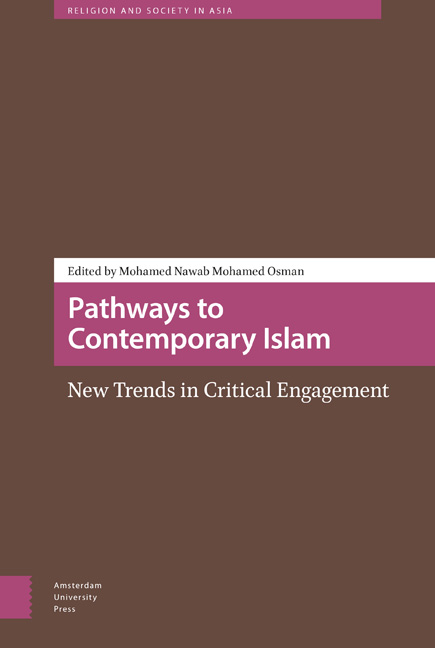Book contents
- Frontmatter
- Dedication
- Contents
- Acknowledgements
- Introduction: Constructing Pathways to Contemporary Islam
- Section 1 Historical Trends in Contemporary Perspective
- Section 2 Contesting the Islamic Intellectual Tradition
- Section 3 Beyond the Arab Revolutions: Political Islam Revised
- Section 4 Contemporary Spaces of Critical Engagement
- Notes on the Contributors
- Index
3 - A New Approach to Islamic Intellectual Tradition
Published online by Cambridge University Press: 25 November 2020
- Frontmatter
- Dedication
- Contents
- Acknowledgements
- Introduction: Constructing Pathways to Contemporary Islam
- Section 1 Historical Trends in Contemporary Perspective
- Section 2 Contesting the Islamic Intellectual Tradition
- Section 3 Beyond the Arab Revolutions: Political Islam Revised
- Section 4 Contemporary Spaces of Critical Engagement
- Notes on the Contributors
- Index
Summary
Abstract
This article attempts to explain the state of contemporary Islamic Intellectualism. Additionally, it proposes a set of abilities, attributes, and responsibilities that Muslim scholars should possess to develop Islamic Intellectualism. To achieve this, this article first provides an analysis of the history of Islamic civilization, and the role of traditional Islamic Intellectualism in pushing the civilization towards new heights in the realms of societal organization, politics, culture, economics, and theology. Islam, as such, had experienced its first renaissance from the eighth to the sixteenth century. Today, the Muslim world is in need of a second renaissance. This is the context in which this article situates the ‘standards’ to which contemporary Muslim intellectuals must strive towards.
Keywords: Islam; Islamic Civilization; Islamic Intellectual Tradition
Historically, ‘Islamic Thought’ has referred to an intellectual endeavour. Since the origins of Islam in the seventh century, Muslims and non-Muslims alike have demonstrated an intellectual curiosity, albeit with different motivations in its theology, rituals, and normative dimensions. Irrespective of their own cultural or religious predispositions, contemporary academics around the world continue to engage in unearthing and producing discourses on Islam and Islamic civilization. In this article, I provide an analysis of Islamic civilizations that shall discuss how Islamic theology intersected with politics, economics, and culture to construct an Islamic ‘way of living’. I shall proceed by providing a historical overview of the foundation of Islamic civilization, before suggesting a few approaches that may guide how ‘Islamic Thought’ can be understood today.
Terminology
Three terms crucial in this chapter are: ‘Islam’, ‘intellectual’, and ‘tradition’. In this section, I will provide an overview of how these terms have been conventionally understood, along with how these conventional definitions have evolved and given rise to new meanings.
ISLAM
Islam can be broken down into two dimensions: (1) Islam as a religion and (2) Islam as a civilization.
Islam as a Religion
The Islamic perspective regards Islam as the final religion sent by God, to mankind through the last prophet, Muhammad. Islam follows the trajectory of divine revelations to all prophets, from Adam, the first man and first prophet, to Muhammad, the last prophet.
- Type
- Chapter
- Information
- Pathways to Contemporary IslamNew Trends in Critical Engagement, pp. 77 - 98Publisher: Amsterdam University PressPrint publication year: 2020

